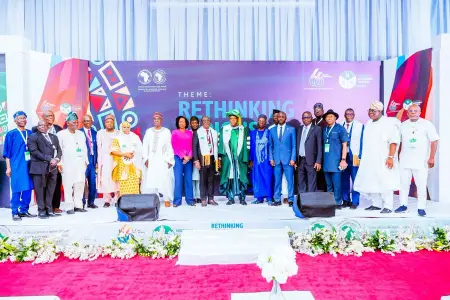Vice President Kashim Shettima has said that recent corporate growth and rising investor confidence are signs that Nigeria’s ongoing reforms are beginning to deliver results, despite the short-term hardships citizens are experiencing.
He made this known at the 66th Annual Conference of the Nigerian Economic Society (NES) in Abuja, where he urged economists across the continent to lead Africa’s economic transformation. According to him, politics and economics are inseparable in shaping Africa’s future.
“The reforms are working, and the corporate growth we see today is proof. These are clear signals of rising investor confidence. But we must acknowledge that our citizens are going through a tough period,” Shettima said.
The Vice President emphasized that economists play a crucial role beyond the classroom, describing them as guides whose ideas influence policy and directly shape the lives of citizens. He stated that Africa must reposition itself in the changing global order, stressing that the continent’s 1.5 billion people should be seen as an asset, not a liability.
Shettima lamented that while Asia and South America have transformed into global growth models, Africa remains trapped in post-colonial structures, with intra-African trade still accounting for only 16 percent of total trade. He warned that the continent cannot continue missing opportunities for growth and inclusion.
In his remarks, the Minister of Livestock Development, Idi Mukhtar Maiha, highlighted Nigeria’s vast but underutilized land resources and pledged new partnerships to cut the country’s dependence on imported meat and dairy products. “We have farmlands; we are looking at practical ideas to transform this sector. The future of this country is not in our hands but in our land. Through the Renewed Hope Agenda of Mr. President, the livestock sector today will be the next crude oil,” Maiha said.
Minister of Budget and Economic Planning, Senator Atiku Bagudu, reaffirmed the Federal Government’s commitment to involving professionals in shaping economic reforms. Former Minister of Finance, Dr. Shamsudeen Usman, also called for more economists in government and legislation to enforce national development plans.
The African Development Bank representative, Dr. Eric Ogunleye, praised Nigeria’s reforms, describing them as a model that could guide Africa toward prosperity.
Earlier, NES President, Professor Adeola Adenikinju, urged the Federal Government to reintegrate the Society into the Nigerian Economic Management Team. The conference, attended by participants from 22 African countries, had the theme: “Rethinking Africa’s Development Pathways to Economic Transformation and Social Inclusion in a Changing Global Economic Landscape.”

